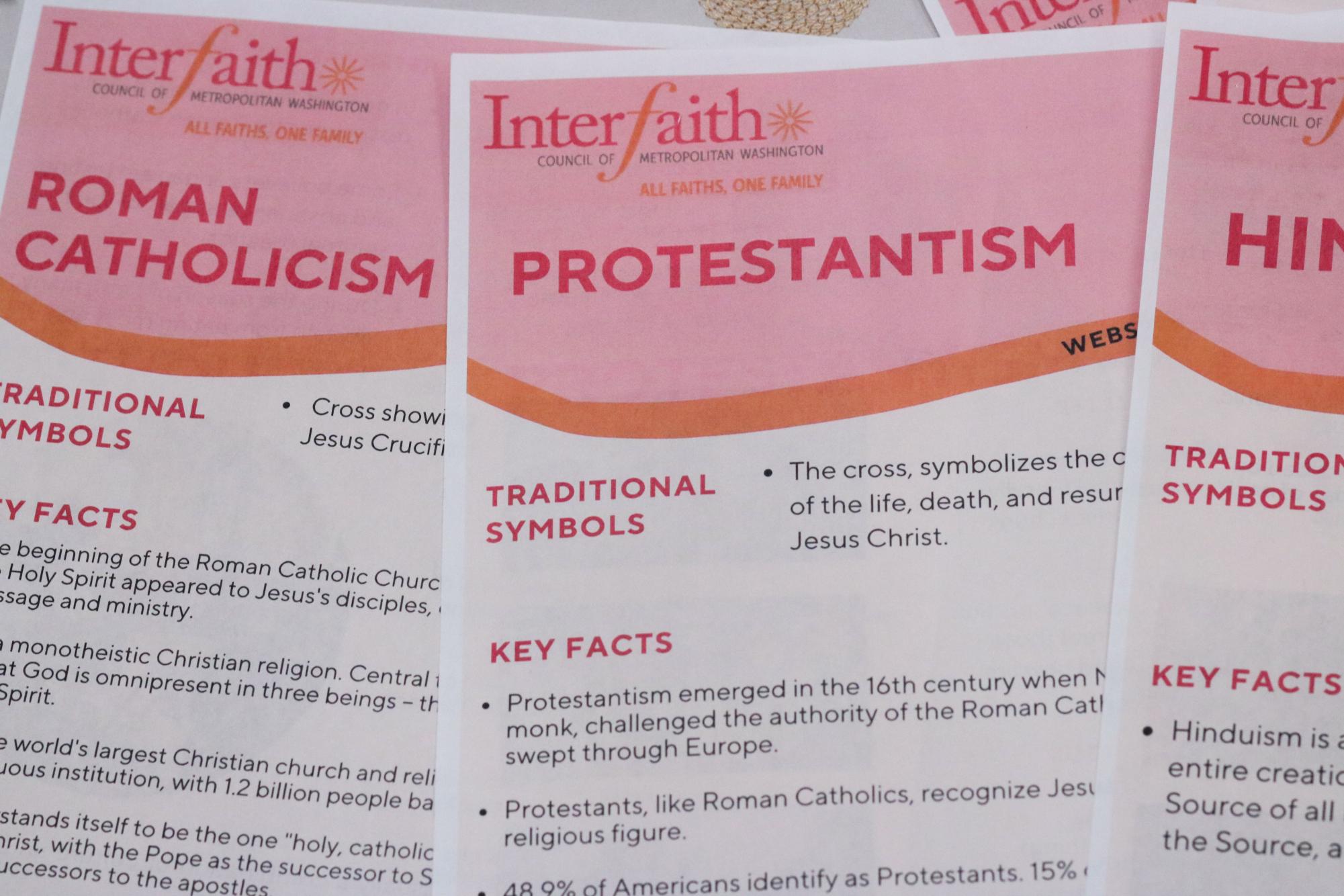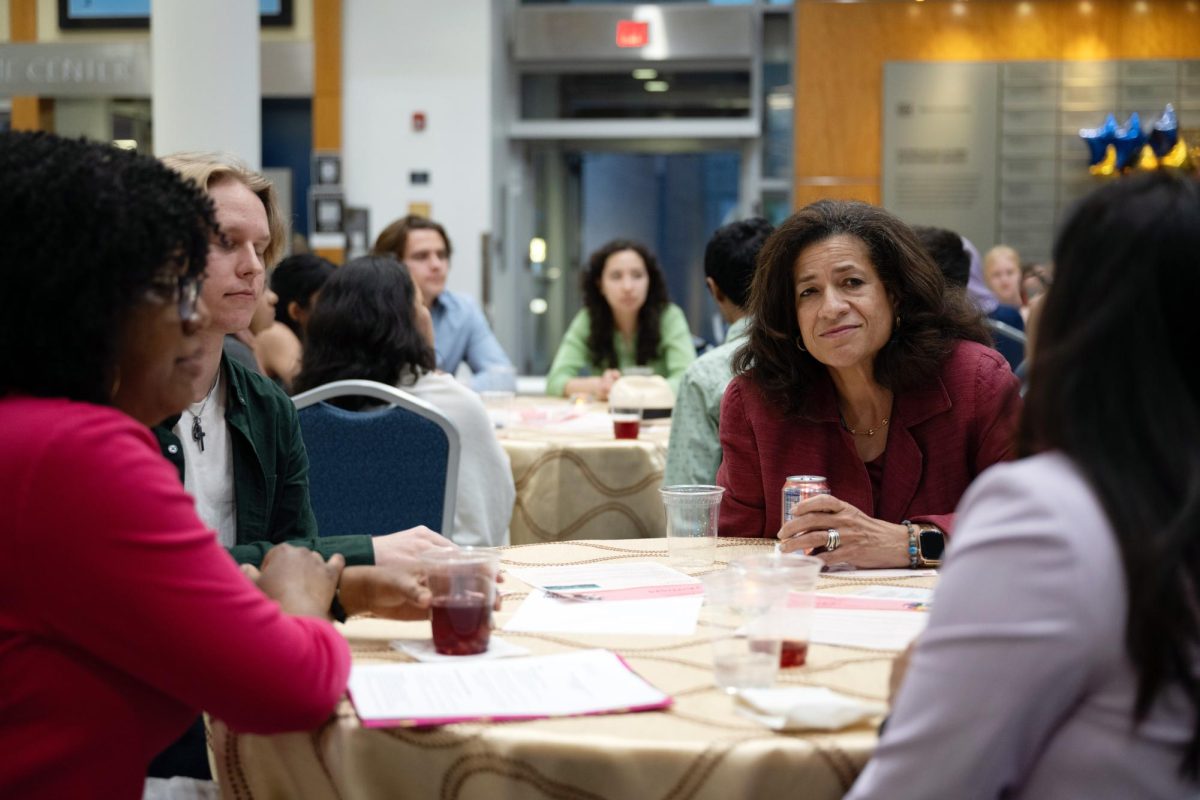The Office of Diversity, Equity and Community Engagement hosted a series of events to foster religious diversity and spirituality among students last week.
Interfaith Week intended to explore and celebrate the “many” spiritual and religious groups on campus through tabling events and dinner discussions hosted by the ODECE, GW Catholics and GW Hillel, according to the ODECE’s Instagram. The week was originally scheduled to take place from Jan. 29 to Feb. 5 and was set to be hosted by the Multicultural Student Services Center, according to an initial programming schedule obtained by The Hatchet.
Student organizations like Jewish Voice for Peace and the Muslim Students’ Association, which were slotted to host an event on the original schedule, were not listed as hosts on the schedule for any of last week’s events.
Vice Provost for the ODECE Caroline Laguerre-Brown said the office was “thrilled” to host Interfaith Week and partner with the MSSC — who hosted Interfaith Week in recent previous years — and explore the different faith and religious communities on campus. She said the ODECE reached out to everyone who was on the “previous schedule” like the Religion Department, the Institute for Middle East Studies and every religious student organization when planning the week.
“All members of the community were invited to participate in the week’s programming, aimed at understanding different perspectives and encouraging positive interactions and learning experiences regarding our faith, religious, and spiritual communities,” Brown said in an email.
The week included tabling events like the “Spiritual Meaning of Donuts” hosted by the ODECE and GW Dining on Tuesday that offered powdered, glazed and plain doughnuts and displayed posters about the baked goods’ symbolism of “completion,” “connection” and “abundance.”
Speakers from GW Falun Dafa — a student group that practices a meditative religious movement founded in China — and the executive director of the InterFaith Council of Metropolitan Washington spoke about their spiritual journeys at an Interfaith Dinner on Thursday on the first floor of the student center in the Great Hall.
The dinner featured a buffet of vegan and vegetarian dishes, servers in suits and a GW photographer rushing around tables draped with tablecloths to snap photos of attendees and speakers. Several University officials, including West, University President Ellen Granberg and Provost Chris Bracey, sat at tables listening to the speakers.
“A culture of peace requires harmony among the different faith traditions,” Sousan Abadian, the executive director of the InterFaith Council, said in her speech. “And that means developing the capacities to accept and allow for there to be differences in this culture, does not require all of us to be the same.”
Some students and organizers lauded last week’s programming for seeking to foster religious inclusion, but others felt that the events fell short of their expectations.
First-year Anna Oestreich said she decided to come to the dinner to participate in “intercultural dialogue,” which she is passionate about. She said she was glad that members of the InterFaith Council facilitated conversation about attendees’ experiences with faith at each table, but was unaware that the dinner would be an “official event.”
“We need to have these spaces for people that choose peace and these sorts of conversations,” Oestreich said. “But at the same time, it does feel like an event oriented towards the University as an organization. I don’t necessarily think that’s a bad thing, but seeing all the cameras sometimes makes it feel like it’s more for show than having a meaningful interaction.”
The ODECE and GW Dining hosted the first tabling event titled “Spread Hummus, Stop Hate” on the first floor of the University Student Center on Monday that offered hors d’oeuvre including Sabra hummus, pretzel packs, pita rounds and vegetables. Syria was one of the first countries to make hummus, where Muslims make up about 90 percent of the population.
“I thought that was the only event that was dedicated to Islam, but then, obviously, once I got there, the person responsible for it said that that wasn’t the intention,” said Fatima Konte, a member of the MSA. “Their whole thing was starting off the week with hummus and bringing the community together because hummus was a big part of Middle Eastern culture.”
Konte said she noticed a lack of representation of religions other than Catholicism and Judaism — particularly an absence in Islamic events — in the week’s overall programming. She said she mentioned the lack of Muslim representation in the week’s programming to Jordan Shelby West, the associate vice provost of the ODECE, who tabled at the event.
She said West replied by saying that the ODECE reached out to the MSA, and the organization declined their invitation to participate because they were busy with their own programming for Ramadan. MSA President Raheel Abubakar said the organization was invited to participate in Interfaith Week but opted not to due to the group’s Ramadan programming.
Konte said she did not attend other events during the week because there was not a “safe space” for the Muslim community due to the absence of Muslim religious groups.
“There’s no Muslim event on the whole schedule and you’re calling it Interfaith Week,” Konte said. “It’s solely focused on Judeo-Christian religions.”
GW Hillel hosted Wednesday a luncheon titled “A Rabbi, an Imam and a Priest Walk Into a Bar…” where about 20 students listened to a panel discussion between Rabbi Dan Epstein, Father Stefan Megyery and Sanjay Jain, a follower of Jainism and associate industry professor of decision sciences, about topics like the afterlife and life’s purpose.
Bernadette Itzkow, the social justice springboard fellow at GW Hillel, said she reached out to “a couple of different mosques” in D.C. for involvement in the “A Rabbi, an Imam, and a Priest Walk Into a Bar…” event, but due to the event’s proximity to Ramadan and Eid al-Fitr, a holy month and holiday in Islam, she couldn’t find an imam to participate and it was not “able to come to fruition” the way she had hoped.
She said it was “the right choice” to shift Interfaith Week to April and “involve everyone that we can” which she said was why officials decided to postpone the event.
“Everyone is really trying their hardest right now,” Itzkow said. “It’s hard to make things happen, and they really made this happen.”

Junior Megan Clancy, the president of GW Catholics, said the organization’s participation in Interfaith Week allowed members to unite religious student organizations and gave students the opportunity to learn more about Catholicism.
“Giving a space for the different faith organizations to invite people in, one, demonstrate who they are and what they think too and also just give a space for people to come explore and think is really, really important to any college student population but especially here at GW,” Clancy said.
Brooke Forgette and Jennifer Igbonoba contributed reporting.





